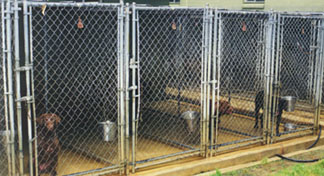 Home Home
 Library Library
 (main page) (main page)
 page 1 page 1
 page 2 page 2
 page 3 page 3
 page 4 page 4
|

|
How to get Your Money's Worth out of Professional Training (Page 2)
It is of utmost importance, when selecting a trainer, to get one who suits you and your dog's needs. If you make a visit to a trainer's establishment and find that you can have a harmonious relationship with the trainer, the dogs look and act good and appear to be well-trained for the stage they are in, and that the most advanced dogs can smoothly demonstrate a level of working expertise that meets your expectations, then that trainer is probably competent to do your work. Of course the facilities, kennel compound, general cleanliness, etc. must be satisfactory. Most retriever trainers we know are strong in the area of dog care. This includes feeding--usually the trainer knows through experience what brand of feed will keep the dogs healthy and fit through the rigors of training, so it is not generally a good idea to ask that your dog be fed a special diet (which is apt to be less beneficial).
 Once you have decided on a trainer, and this may involve some travel, several interviews, and possibly recommendations from various clients, you are ready to commit yourself, and your young dog, to his services. This is a big step, but one that we believe must be made in order to achieve the best results. You should in no way suspect your trainer of dishonesty, erratic training habits, bill padding, etc. If these questions are in your mind you should probably still be shopping. If you cannot find it in yourself to place your trust in a trainer, then professional training may not be for you. The vast majority of trainers work hard and conscientiously for their monthly fee, so your chances of being ripped-off are fairly small.
Once you have decided on a trainer, and this may involve some travel, several interviews, and possibly recommendations from various clients, you are ready to commit yourself, and your young dog, to his services. This is a big step, but one that we believe must be made in order to achieve the best results. You should in no way suspect your trainer of dishonesty, erratic training habits, bill padding, etc. If these questions are in your mind you should probably still be shopping. If you cannot find it in yourself to place your trust in a trainer, then professional training may not be for you. The vast majority of trainers work hard and conscientiously for their monthly fee, so your chances of being ripped-off are fairly small.
 |
|
Make sure the facilities meet your requirements. |
 Trust is particularly important when the trainer says something you don't want to hear. Some dogs, for example, will be severely set back if taken hunting early in their training. Their ability to learn, and in particular to transfer their responsiveness from trainer to owner and to the hunting environment, may be irreparably damaged, or they may need several months to make up what they have lost. Based on evaluation, over weeks or months of work with your dog, the trainer may recommend against such an interruption. This may be a big disappointment, but trusting your trainer's judgment will pay off in subsequent hunting seasons. There are many situations where the trainer's professional judgment could appear to the distrustful client as self-interest, so the issues of trust and commitment must be resolved ahead of time.
Trust is particularly important when the trainer says something you don't want to hear. Some dogs, for example, will be severely set back if taken hunting early in their training. Their ability to learn, and in particular to transfer their responsiveness from trainer to owner and to the hunting environment, may be irreparably damaged, or they may need several months to make up what they have lost. Based on evaluation, over weeks or months of work with your dog, the trainer may recommend against such an interruption. This may be a big disappointment, but trusting your trainer's judgment will pay off in subsequent hunting seasons. There are many situations where the trainer's professional judgment could appear to the distrustful client as self-interest, so the issues of trust and commitment must be resolved ahead of time.
 The time a retriever must stay in training to achieve a satisfactory result is extremely variable, so you should not expect your trainer to say, "This can be done in 6 weeks; that in 12 weeks," etc. Dogs have greatly different learning rates, and the time needed to transfer learned behaviour into habitual behavior also varies depending on their breeding and upbringing. Until the trained routines, such as force fetching, delivery, steadiness, and many other areas of schooling become habitual, they are likely to disappear quickly if not attended to through daily drills.
The time a retriever must stay in training to achieve a satisfactory result is extremely variable, so you should not expect your trainer to say, "This can be done in 6 weeks; that in 12 weeks," etc. Dogs have greatly different learning rates, and the time needed to transfer learned behaviour into habitual behavior also varies depending on their breeding and upbringing. Until the trained routines, such as force fetching, delivery, steadiness, and many other areas of schooling become habitual, they are likely to disappear quickly if not attended to through daily drills.
 So, since no one can predict how long a particular goal will take, you must be willing to work with your trainer within general time frameworks, with monthly reports as to your dog's progress. It is easier for a trainer to to make time-in-training predictions as the dog's training progresses, but even after several months of work, the trainer will usually say something to the effect that "the job isn't done until its done, and it isn't done until...." you know the rest. This is particularly true of force fetching, force on back, stopping on the whistle, and so forth. Areas such as quality of marking and development of momentum are much less tangible, tending to improve with experience (although not steadily).
So, since no one can predict how long a particular goal will take, you must be willing to work with your trainer within general time frameworks, with monthly reports as to your dog's progress. It is easier for a trainer to to make time-in-training predictions as the dog's training progresses, but even after several months of work, the trainer will usually say something to the effect that "the job isn't done until its done, and it isn't done until...." you know the rest. This is particularly true of force fetching, force on back, stopping on the whistle, and so forth. Areas such as quality of marking and development of momentum are much less tangible, tending to improve with experience (although not steadily).
 As your trainer works through the training program it will become evident that your dog is ahead or behind the average schedule. If it takes somewhat longer you're probably making a wise choice to go with the extended period of training. If your pup is way ahead of schedule, feel blessed as you may be able to have it trained to a level you had not planned on within your budget and time framework.
As your trainer works through the training program it will become evident that your dog is ahead or behind the average schedule. If it takes somewhat longer you're probably making a wise choice to go with the extended period of training. If your pup is way ahead of schedule, feel blessed as you may be able to have it trained to a level you had not planned on within your budget and time framework.
 Training a retriever is definitely a step by step procedure, so believe your trainer when he says your dog needs another week, or month, of a particular phase of his training to make him solid. The value of succeeding steps depends largely on preceding steps. Short cuts in training are rarely beneficial and will ultimately cost you more than they save.
Training a retriever is definitely a step by step procedure, so believe your trainer when he says your dog needs another week, or month, of a particular phase of his training to make him solid. The value of succeeding steps depends largely on preceding steps. Short cuts in training are rarely beneficial and will ultimately cost you more than they save.

|





